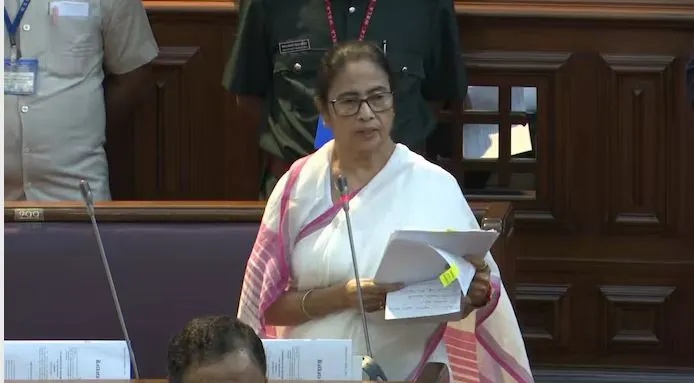By Sujit Bhar
Within the public uproar against the rape and murder of the lady doctor at the RG Kar Medical College and Hospital in Kolkata, the West Bengal Assembly unanimously passed a strict anti-rape Bill, called the Aparajita Woman and Child (West Bengal Criminal Laws and Amendment) Bill, 2024.
The Bill (awaiting the signatures of the governor and then of the president of India) seeks capital punishment for a rape convict if the assault results in death of a victim or leaves her in a vegetative state. It also seeks life sentence without parole for any other offender.
The Bill, drafted mostly by women lawyers and legal experts, advocates provisions for the completion of a probe into a rape case within 21 days of the initial report, a reduction from the previous two-month deadline, and proposes women officers to lead investigations by a Special Task Force into such incidents.
West Bengal Chief Minister Mamata Banerjee said in the state assembly that the bill was “historic”. This was also a politically clever move, because the BJP, the main opposition in the state, had no option, but to support the Bill’s passage.
Mamata said in the assembly that West Bengal had 88 functional fast track courts (as of May 2023), the third highest in the country after Uttar Pradesh (372) and Maharashtra (97). It was not immediately clear how many of those fast track courts were actually functional.
The chief minister further said: “When the Bharatiya Nyaya Sanhita (BNS) was being implemented, I wrote to the Prime Minister, saying that they should not be in a hurry to implement it. There should have been more clarification. Had that happened, this situation would not have arisen.”
While advocating strict punishments, the Bill basically has amended (for the state) certain sections of the Bharatiya Nyaya Sanhita 2023, Bharatiya Nagarik Suraksha Sanhita, 2023 and the Protection of Children from Sexual Offences (POCSO) Act, 2012.
The Bill has cut the investigation time down to the minimum. It says: “If it is not possible to complete the investigation within… 21 days from the date of information recorded by the officer-in-charge of the police station, then the said (sic) period can be further extended not exceeding 15 days by any police officer not below the rank of Superintendent of Police or equivalent, after recording the reasons in writing in the case diary maintained under Section 192 of the Bharatiya Nagarik Suraksha Sanhita, 2023.”
About the fast track courts, the Bill states that they “will be equipped with the necessary resources and expertise to handle cases of rape of women and sexual offenses against children efficiently, effectively, and timely.”
The Bill also has provision for an “Aparajita Task Force”. According to the Bill, a Special Task Force (STF) at the district level, will be constituted to investigate cases of rape or atrocities on women and children. This STF will be “headed by a deputy superintendent of police for the investigation of specified offences as defined under clause (e) of Section 2 of the Aparajita Woman and Child (West Bengal Criminal Laws Amendment) Bill, 2024.”
The Bill wants to amend Sections 64, 66, 70(1), 71, 72(1), 73, 124(1), and 124 (2) of BNS. These sections pertain to punishment for rape, rape and murder, gangrape, repeat offenders, disclosure of victim’s identity and even causing hurt by use of acid, etc. The provisions have made stricter recommendations than the BNS.
The Bill also proposes to omit Sections 65(1), 65 (2), and 70 (2) of the said Act, pertaining to the punishments for convicted rape perpetrators under 16 years, 12 years, and 18 years, respectively.
As per the Bill, “The investigations under sub-section (1), carried out under specified offences by the Special Task Force shall, as far as possible, be conducted by a female police officer. All officers of the government or any other person whose assistance is sought, whether orally or in writing, shall without any delay assist the officers of the Special Task Force. Whoever… causes delay or intentionally omits to give such assistance, shall be punished with imprisonment for a term which may extend to six months, or with a fine which may extend to five thousand rupees, or with both.” The punishment for repeat offenders in such cases would be imprisonment for life.
There is a media control proposal in this Bill as well. This seeks to penalise the unauthorised printing or publishing of any matter related to court proceedings with a punishment of “imprisonment of 3 to 5 years and fine”. That could prove contentious at many levels.
Even police officers and medical practitioners could be under surveillance in this Bill. While supporting the passage of this Bill, BJP’s Suvendu Adhikari proposed amendments which included “any police officer(s) or any medical practitioner who delays or shows negligence in conducting appropriate medical test(s) or post-mortem shall be subject to imprisonment for the remainder of that person’s natural life or death.”
In all, the Bill is a much amplified version of what is available in the BNS, though the long-term effect or the misuse of such strict provisions could be in question and needs to be debated.


